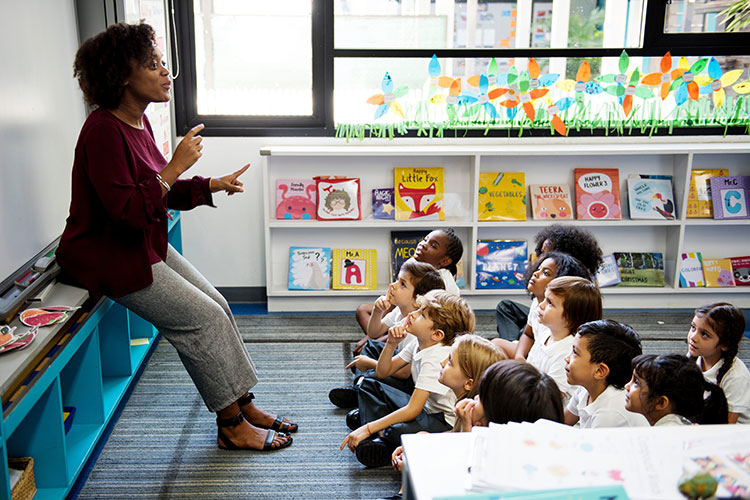Faculty members from the School of Education recently received a $2.87 million grant from the U.S. Department of Education for an inclusive early childhood education program. The five-year grant from the department’s Office of English Language Acquisition will support an inclusive early childhood program that offers dual certification in early childhood education and early childhood special education along with add-on certification (if students choose) for English as a Second Language and/or Bilingual Education.
The principal investigator for the project is Tatiana Joseph, assistant professor in the Department of Teaching and Learning’s second language program. Co-principal investigators, all in the Department of Teaching and Learning are: Maggie Bartlett, associate professor, early childhood special education program; Leanne Evans, associate professor, early childhood education program; and Sara Jozwik, assistant professor, exceptional education program.
The program is set to start in the fall of 2023.
“We focused on early childhood specifically because of all the language development that happens then,” said Joseph. “It is really a chance to build skills within and across languages. We have a chance to make an early impact.”
The program is designed to support both students entering the teaching profession and teachers already in classrooms. In addition to helping teachers develop the skills they need to respond to different needs, the program will provide mentors to work with them.
“The timing of the grant competition worked out for us,” said Jozwik. “We put our heads together [to] look at pathways to meet a need in the workforce and align our programs to fit the goals of the call – increasing achievement for English language learners.”
The traditional model has been to prepare and certify teachers in specific areas, according to the team working on this project. That often means the child has to leave the classroom to receive support services for their special needs. “In their interactions at school with that student, they’re only taking a young child and saying I’m going to be your reading teacher part of the day, and then someone else will come in and do the language support for you,” Jozwik added.
“We want to build this competency within each of our teacher candidates so children will have a teacher able to teach all learners and be able to work in a more affirming inclusive space, said Evans.
“This grant aligns beautifully with the work we are already doing in early childhood and early childhood special education where we are coming together to create an inclusive early childhood education program,” Evans said.
School districts are looking for teachers who are prepared to teach children who are bilingual, according to the School of Education grant team.
The need varies from district to district and from school to school.
The state report card for Milwaukee shows an average of 12 percent of the school population is eligible for language assistance, Jozwik said. However, some schools have few students who need support; in others the percentage is more than 50%, said Joseph.
“When we were brainstorming about this grant, the needs of our city were at the forefront,” said Joseph. “Often children starting early childhood education programs are already behind.” Helping teachers use the tools to work with all the children in their classroom can help close those opportunity gaps.
The new program will also work to encourage more teachers from diverse backgrounds to become part of the profession. Right now, the majority of teachers are white females while the student population is much more culturally and linguistically diverse, according to the program team.
“As you go into schools, you see many Black and brown people working as aides or assistants,” said Joseph. “This funding can help us reach out to these people who are already working at schools and who are interested. We can support them in their pathway to get a teaching license.”
It’s important for children to see teachers who look like them, said Bartlett.
“We know there is a gaping disproportionality between students’ cultural and linguistic backgrounds and those of their teachers,” Evans added. “Children need to see teachers who can understand their language and cultural ways of doing things.”
One focus of the program will be to give teachers the cultural background to recognize children who have different languages and abilities as having unique assets, said Bartlett. “We need to affirm their abilities and their identities.” While the grant uses the term “English Language Learners,” the team members refer to that part of the program as serving children with multiple languages or “emergent bilinguals.”
Miscommunication, mislabeling and misdiagnosis can result when young children are judged by one factor such as language learning, said Joseph. “That can lead to a series of bad decisions that lead to bad experiences and a lack of learning for that child. “We are hoping to get in front of that by showing teachers how to understand the whole picture.”
The program is now going through the official approval process for courses and recruiting its first group of teachers.
